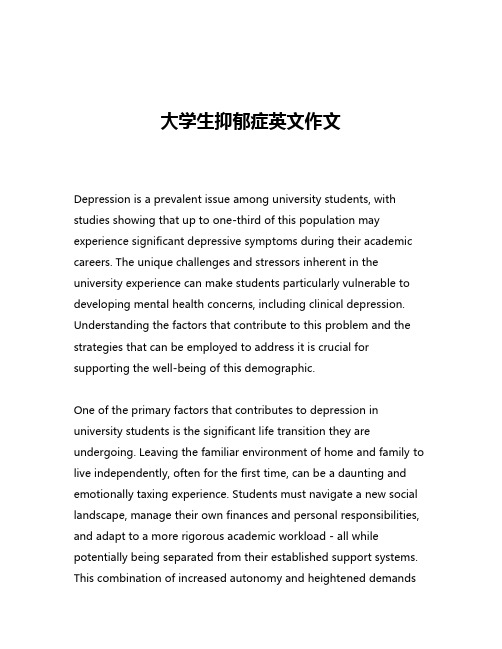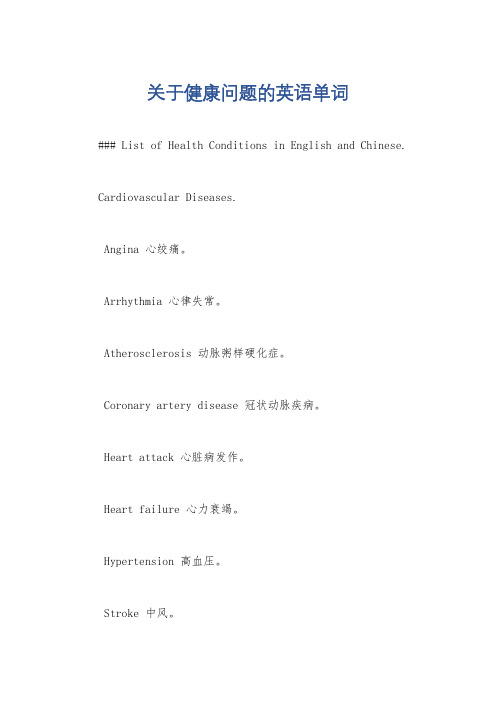抑郁症英文
大学生心理健康教育之认识抑郁症

• • • • • • • • • • •
• 【严重标准】社会功能受损,给本人造成痛苦 或不良后果。 • 【病程标准】 • (1)符合症状标准和严重标准至少已持续2 周。 • (2)可存在某些分裂性症状,但不符合分裂 症的诊断。若同时符合分裂症的症状标准,在 分裂症状缓解后,满足抑郁发作标准至少2周。 • 【排除标准】排除器质性精神障碍,或精 神活性物质和非成瘾物质所致抑郁。
抑郁症的症状
• 1.几周感觉或表现出忧愁和消沉 有这种 症状的人可能无法说出他们如何感觉忧 愁.但是,朋友和家人很容易从他们的脸上 看出他们的不高兴.他们比平常更容易哭 泣.当问他们为什么这样时,他们说不出原 因. 面对于临床抑郁症患者,尽管境况变 好,他们的感觉仍然不好. 有一些人产生 忧愁感觉没有任何预兆,他们甚至在顺境 中也出现忧愁感.
抑郁症的症状
• 9无用或负疚感 在临床抑郁症患者中,他们觉 得他们对其自身和别人没有任何贡献,他们感 到他们的生活不重要并且没有任何意义. 一些 抑郁症患者对他们控制范围内的事情进行自我 责备.他们可能对很久以前的小事情感觉极大 的自卑.这件事情可能是几年以前从没被人留 意过的事情.有一些人因为抑郁症感觉自卑,他 们失去了正确观察事物的能力.在没有任何证 据的境况下,他们认为自己做错了什么事情. 自 卑导致了患者产生无用感.
为什么抑郁症总和自杀联系在 一起
• 北京去年有15名高校生自杀 抑郁症和高自杀率成正相关 • 《羊脂球》的作者莫泊桑用刀割开了自己的喉咙,《老人与海》 的作者海明威举枪自尽,朦胧派诗人海子卧轨寻死,香港著名艺 人张国荣跳楼而亡。这些人都死在了自己手上,他们都有个共同 的特征,抑郁症。数据表明,在全球自杀人群中,有45%到70% 的人患有抑郁症,而全球男性每年有5.8%、女性有9.5%会抑郁 症发作。为什么抑郁症会和高自杀率成正相关呢?抑郁症患者的 自杀念头,起源于恶劣心境下的绝望和自责,因为能很清楚的看 清自己的缺陷,却没法去改变;想摆脱一种命运,却又感觉那是 注定的,总之在一个怪圈里很失望很困扰。首先,需要确认的是, 引起自杀的这些感觉,其本身是病态的结果。而抑郁病情的反复, 会让虚构出的感受不停地产生强度的变化,从而引起自杀念头的 强弱变化。某些患者在坚定了自杀念头之后,情绪会有所好转, 正是因为自己心里所虚构出的感受淡化的结果。然而,对于多数 拥有自杀念头的抑郁症患者而言,一味地劝说是毫无意义的。因 为他们的信念,已经被虚构的现实完全占领了,在他们的脑海里, 看不到任何光明的,正面的,客观的事物,而只剩下那些灰色的, 片面的,主观的绝望。
预防抑郁症英文作文

预防抑郁症英文作文英文回答:Preventing Depression。
Depression is a mood disorder that causes persistent feelings of sadness and hopelessness. It can also lead to a variety of other symptoms, including loss of interest in activities, changes in appetite and sleep, difficulty concentrating, and physical pain.Depression is a serious mental illness that can have a significant impact on a person's life. It can make it difficult to work, study, or socialize. It can also lead to relationship problems, financial difficulties, and even suicide.The good news is that depression is a treatable condition. There are a variety of treatments available, including medication, therapy, and lifestyle changes. Withthe right treatment, most people with depression can recover and live full and productive lives.There are a number of things you can do to help prevent depression, including:Exercise regularly. Exercise has been shown to improve mood and reduce symptoms of depression. Aim for at least 30 minutes of moderate-intensity exercise most days of the week.Eat a healthy diet. Eating a healthy diet can help improve your overall health and well-being. Make sure to eat plenty of fruits, vegetables, and whole grains. Limit your intake of processed foods, sugary drinks, and unhealthy fats.Get enough sleep. Most adults need 7-8 hours of sleep per night. When you don't get enough sleep, it can worsen your mood and increase your risk of depression.Manage stress. Stress can trigger depression in somepeople. Find healthy ways to manage stress, such as exercise, yoga, meditation, or spending time in nature.Connect with others. Having strong social connections can help protect against depression. Make time for friends and family, and get involved in activities that you enjoy.Avoid alcohol and drugs. Alcohol and drugs can worsen depression symptoms. If you are struggling with depression, it is important to avoid using these substances.Talk to a doctor if you are feeling depressed. If you are experiencing symptoms of depression, it is important to talk to a doctor. Depression is a treatable condition, and with the right treatment, you can recover and live a full and productive life.中文回答:预防抑郁症。
抑郁症英文介绍 ppt课件

精力减退 ,疲惫
背 影
ppt课件
12
04
Life
in the depressive
symptom
inappetence
食欲不振,体重减轻
背 影
ppt课件
13
05
Life
in the depressive
symptom
Want killgain
9
01
Life
in the depressive
symptom
Unhappy longtime
长期无愉快感
背 影
ppt课件
10
02
Life
in the depressive
symptom
sleeplessness
失眠
背 影
ppt课件
11
03
Life
in the depressive
symptom
ppt课件
抑郁症
当它成为一种安静的表述 当它成为世界的影子 他孤独地看着 那个仿佛永远看 不见的 影子
7
why
why will we suffered from depression
Hereditary factors
Psychological factors
Social factors
ppt课件
ppt课件
Design BY 朱超毅
2
Rowan Atkinson
罗温·艾金森
ppt课件
3
三毛
sss
ppt课件
4
乔任梁
乔任梁
ppt课件
5
张国荣
ppt课件
抑郁症 英文作文

抑郁症英文作文英文:Depression is a serious mental illness that affects millions of people worldwide. It can be caused by a variety of factors, including genetics, environmental factors, and life events. Symptoms of depression can include feelings of sadness, hopelessness, and worthlessness, as well as changes in sleep patterns, appetite, and energy levels.I have personally struggled with depression for many years. It can be a daily battle to keep my thoughts and emotions in check. One of the most difficult aspects of depression is the feeling of isolation and loneliness that often accompanies it. It can be hard to reach out for help when you feel like no one understands what you're going through.However, seeking help is crucial in managing depression. Therapy, medication, and support groups can all beeffective in treating depression. It's important to find a treatment plan that works for you and to be patient with yourself as you work towards recovery.中文:抑郁症是一种严重的精神疾病,影响着全球数百万人。
大学生抑郁症英文作文

大学生抑郁症英文作文Depression is a prevalent issue among university students, with studies showing that up to one-third of this population may experience significant depressive symptoms during their academic careers. The unique challenges and stressors inherent in the university experience can make students particularly vulnerable to developing mental health concerns, including clinical depression. Understanding the factors that contribute to this problem and the strategies that can be employed to address it is crucial for supporting the well-being of this demographic.One of the primary factors that contributes to depression in university students is the significant life transition they are undergoing. Leaving the familiar environment of home and family to live independently, often for the first time, can be a daunting and emotionally taxing experience. Students must navigate a new social landscape, manage their own finances and personal responsibilities, and adapt to a more rigorous academic workload - all while potentially being separated from their established support systems. This combination of increased autonomy and heightened demandscan be overwhelming, leading to feelings of isolation, anxiety, and a diminished sense of control.Moreover, the academic pressures inherent in the university setting can be a major contributor to depression among students. The pressure to excel academically, maintain high grades, and secure internships or post-graduation employment can place a significant burden on students' mental and emotional resources. The fear of failure, coupled with the intense competition fostered in many academic environments, can exacerbate feelings of inadequacy, self-doubt, and low self-esteem - all of which are hallmark symptoms of depression.In addition to the academic and transitional challenges, many university students also face concerns related to their physical health and well-being. The transition to university life can disrupt established routines and healthy habits, leading to irregular sleep patterns, poor nutrition, and decreased physical activity. These lifestyle changes can have a direct impact on an individual's mental health, as physical well-being is closely linked to emotional and psychological functioning.Furthermore, the university environment can also expose students to additional risk factors for depression, such as substance abuse, relationship difficulties, and financial stressors. The availability ofalcohol and drugs on many campuses, coupled with the social pressures to engage in these behaviors, can lead to problematic patterns of use that exacerbate depressive symptoms. Similarly, the challenges of navigating new romantic relationships or the dissolution of existing ones can be a significant source of distress for university students, further contributing to the development of depression.It is important to recognize that the manifestation of depression in university students may differ from the typical presentation in other populations. While the core symptoms of persistent low mood, loss of interest, and changes in appetite and sleep patterns may be present, university students may also exhibit unique behaviors, such as increased procrastination, difficulty concentrating on academic tasks, and a decline in academic performance. These symptoms can further compound the existing challenges faced by students, creating a vicious cycle that perpetuates the depressive episode.Fortunately, there are a number of strategies and interventions that can be employed to address depression among university students. One of the most important steps is to destigmatize mental health concerns and encourage open dialogue about the challenges students are facing. By fostering a campus culture that normalizes the experience of mental health struggles and promotes help-seeking behavior, universities can empower students to be proactivein addressing their emotional well-being.Additionally, universities should strive to provide comprehensive mental health services and resources on campus, including counseling centers, support groups, and accessible mental health education programs. These services can offer students the opportunity to address their depression through evidence-based treatments, such as cognitive-behavioral therapy and pharmacological interventions, while also providing practical coping strategies and skills for managing stress and maintaining overall well-being.Beyond the institutional level, it is also crucial for university students to develop personal strategies for self-care and resilience-building. This may include engaging in regular physical exercise, practicing mindfulness or meditation, maintaining a balanced sleep schedule, and cultivating a strong social support network. By prioritizing their overall health and well-being, students can better equipped to navigate the challenges of university life and mitigate the risk of developing depression.It is important to note that addressing depression among university students requires a multifaceted approach, involving the collaboration of administrators, mental health professionals, faculty, and the students themselves. By acknowledging the uniquechallenges faced by this population and implementing comprehensive, evidence-based strategies, universities can play a vital role in supporting the mental health and overall well-being of their students, ultimately fostering an environment that enables academic and personal success.In conclusion, depression is a significant concern among university students, with the unique stressors and transitions of the university experience contributing to the development of this mental health issue. By understanding the factors that contribute to depression in this population and implementing effective interventions, universities can play a crucial role in supporting the emotional well-being of their students and promoting a healthy, thriving academic community.。
关于健康问题的英语单词

关于健康问题的英语单词### List of Health Conditions in English and Chinese. Cardiovascular Diseases.Angina 心绞痛。
Arrhythmia 心律失常。
Atherosclerosis 动脉粥样硬化症。
Coronary artery disease 冠状动脉疾病。
Heart attack 心脏病发作。
Heart failure 心力衰竭。
Hypertension 高血压。
Stroke 中风。
Respiratory Diseases.Asthma 哮喘。
Bronchitis 支气管炎。
Chronic obstructive pulmonary disease (COPD) 慢性阻塞性肺疾病。
Emphysema 肺气肿。
Influenza 流感。
Lung cancer 肺癌。
Pneumonia 肺炎。
Tuberculosis 结核病。
Gastrointestinal Diseases.Cirrhosis 肝硬化。
Colitis 结肠炎。
Constipation 便秘。
Crohn's disease 克罗恩病。
Diarrhea 腹泻。
Gallstones 胆结石。
Gastroesophageal reflux disease (GERD) 胃食管反流病。
Hemorrhoids 痔疮。
Hepatitis 肝炎。
Irritable bowel syndrome (IBS) 肠易激综合征。
Peptic ulcer disease 消化性溃疡病。
Neurological Diseases.Alzheimer's disease 阿尔茨海默病。
Amyotrophic lateral sclerosis (ALS) 肌萎缩侧索硬化症。
Brain cancer 脑癌。
Cerebral palsy 脑瘫。
Dementia 痴呆。
西医神经科、精神科术语英文翻译

西医神经科、精神科术语英文翻译以下是常见的西医神经科术语英文翻译:1. 神经学:Neurology2. 神经系统:Nervous System3. 大脑:Brain4. 脊髓:Spinal Cord5. 神经元:Neuron6. 神经胶质细胞:Glial Cells7. 突触:Synapse8. 轴突:Axon9. 树突:Dendrites10. 髓鞘:Myelin Sheath11. 神经递质:Neurotransmitters12. 神经传导通路:Nerve Conduction Pathways13. 反射:Reflex14. 痛觉:Pain Sensation15. 感觉运动传导通路:Sensorimotor Pathways16. 自主神经系统:Autonomic Nervous System17. 中枢神经系统:Central Nervous System (CNS)18. 外周神经系统:Peripheral Nervous System (PNS)19. 神经肌肉接头:Neuromuscular Junction20. 癫痫:Epilepsy21. 帕金森病:Parkinson's Disease22. 多发性硬化症:Multiple Sclerosis (MS)23. 脑卒中:Stroke24. 脑外伤:Traumatic Brain Injury (TBI)25. 脑瘤:Brain Tumors26. 脑炎:Brain Infections / Encephalitis27. 神经痛:Neuralgia28. 头痛:Headache29. 失眠:Insomnia30. 肌肉萎缩:Muscle Atrophy31. 肌无力:Muscle Weakness32. 神经根病:Radiculopathy33. 神经丛病变:Plexopathy34. 脊髓病变:Myelopathy35. 脑积水:Hydrocephalus36. 脊髓空洞症:Syringomyelia37. 脑电图(EEG):Electroencephalogram (EEG)38. 肌电图(EMG):Electromyogram (EMG)39. 经颅磁刺激(TMS):Transcranial Magnetic Stimulation (TMS)40. 正电子发射断层扫描(PET):Positron Emission Tomography (PET)41. 功能磁共振成像(fMRI):Functional Magnetic Resonance Imaging (fMRI)42. 单光子发射计算机断层扫描(SPECT):Single Photon Emission Computed Tomography (SPECT)43. 经颅多普勒超声(TCD):Transcranial Doppler Ultrasound (TCD)44. 认知障碍:Cognitive Dysfunction45. 情绪障碍:Mood Disorders46. 神经退行性疾病:Neurodegenerative Diseases47. 中毒性脑病:Toxic Encephalopathy48. 脑死亡:Brain Death49. 昏迷:Coma50. 意识障碍:Disorders of Consciousness西医精神科术语英文翻译以下是常见的西医精神科术语英文翻译:1. 焦虑症:Anxiety Disorders2. 抑郁症:Depression3. 精神分裂症:Schizophrenia4. 双相情感障碍:Bipolar Disorder5. 创伤后应激障碍:Post-Traumatic Stress Disorder (PTSD)6. 强迫症:Obsessive-Compulsive Disorder (OCD)7. 失眠症:Insomnia8. 嗜睡症:Hypersomnia9. 睡眠障碍:Sleep Disorders10. 神经衰弱:Neurasthenia11. 精神发育迟滞:Mental Retardation12. 自闭症谱系障碍:Autism Spectrum Disorders (ASD)13. 注意缺陷多动障碍:Attention Deficit Hyperactivity Disorder (ADHD)14. 抽动症:Tic Disorders15. 创伤性脑损伤:Traumatic Brain Injury (TBI)16. 进食障碍:Eating Disorders17. 物质滥用:Substance Abuse18. 心理治疗:Psychotherapy19. 药物治疗:Pharmacotherapy20. 电休克疗法:Electroconvulsive Therapy (ECT)21. 支持性心理治疗:Supportive Psychotherapy22. 暴露疗法:Exposure Therapy23. 认知行为疗法:Cognitive Behavioral Therapy (CBT)24. 人际关系疗法:Interpersonal Therapy (IPT)25. 心理疏导:Psychological Counseling26. 精神科会诊:Psychiatric Consultation27. 心理评估:Psychological Evaluation28. 心理测验:Psychological Testing29. 精神卫生机构:Mental Health Facilities30. 心理健康促进活动:Mental Health Promotion Activities31. 精神疾病预防:Mental Illness Prevention32. 心理健康干预措施:Mental Health Intervention Measures33. 心理疏导热线:Psychological Counseling Hotline34. 心理健康服务:Mental Health Services35. 精神卫生保健工作者:Mental Health Care Workers36. 心理疾病患者支持团体:Support Groups for People with Mental Illnesses37. 精神卫生法:Mental Health Law38. 心理健康政策:Mental Health Policies39. 精神卫生运动:Mental Health Initiatives40. 心境障碍:Mood Disorders (MDs)。
写抑郁症的作文800字

写抑郁症的作文800字英文回答:Depression, also known as major depressive disorder or clinical depression, is a mental health condition that affects millions of people worldwide. It is characterized by persistent feelings of sadness, hopelessness, and a lack of interest or pleasure in activities. Personally, I have experienced depression and it has had a profound impact on my life.One of the main symptoms of depression is a persistent low mood. It's like a dark cloud hanging over me, making it difficult to find joy in anything. For example, I used to love playing the guitar, but during a depressive episode, I couldn't bring myself to pick it up. It felt like a chore rather than something I enjoyed.Another symptom of depression is a loss of interest or pleasure in activities. I remember a time when my friendsinvited me to go hiking, something I used to love. However, I just couldn't muster up the energy or motivation to go.It felt overwhelming and pointless.Depression also affects my sleep patterns. I often struggle with insomnia, finding it difficult to fall asleep or stay asleep throughout the night. This lack of sleep further exacerbates my depressive symptoms, making it even harder to function during the day.Furthermore, depression can also lead to physical symptoms. For me, it manifests as a constant feeling of fatigue and low energy. It's like carrying around a heavy weight all the time, making even the simplest tasks feel exhausting.中文回答:抑郁症,也被称为重度抑郁障碍或临床抑郁症,是一种影响全球数百万人的心理健康疾病。
- 1、下载文档前请自行甄别文档内容的完整性,平台不提供额外的编辑、内容补充、找答案等附加服务。
- 2、"仅部分预览"的文档,不可在线预览部分如存在完整性等问题,可反馈申请退款(可完整预览的文档不适用该条件!)。
- 3、如文档侵犯您的权益,请联系客服反馈,我们会尽快为您处理(人工客服工作时间:9:00-18:30)。
2.1.1 the symptoms of slight and major depression
Depression is a medical condition in which a person feels very sad and anxious and often has physical symptoms.Slight depression could be a portion of major depression, so the criteria for this disease are important to consider and examine for people with the problem. If the depression is only minor, it will not have all of the components of major depression and therefore would be treated differently from the more serious version of the disease.The most common diagnostic criteria are encapsulated in the mnemonic device SIGECAPS. They are in the order of the letters, Sleep problems, lack of Interest, Guilty feelings, lack of Energy, problems with Concentration, Appetite and weight disturbances, Psychomotor retardation, and Suicidal thoughts or actions. If a person has five or six items in this criteria it is very likely that they have major depression and they should be treated for it. If they only have one or two of them they might have a less serious version of the disease, but it still may require treatment. The only difference is that it could be more minor. By asking about these different symptoms, people perform a basic diagnosis test to evaluate themselves or their patients.
The symptoms of serious to slight depression may be very debilitating to a patient and identification of the problem is the first step to a full recovery. The condition of depressive disorders is prevalent through all walks of life and it is expected that the majority of persons will experience symptoms of depression at least once in the course of their life. However, since most people experience these symptoms at some point, extended research has been done to determine the best way to treat these specific conditions and many solutions are available to sufferers.
2.1.2 cause of depression
Irregular diet habits cause digestive problems and lead to the assimilation
of fats. An excess of carbohydrates like cereals, white sugar, Coffee, tea,
chocolates and comparatively less quantities of vegetables and fruits in
the diet may result in indigestion. Due to indigestion, gases are produced
in the digestive tract, causing compression over the diaphragm in the
region of the heart and lungs. This in turn, reduces the supply of oxygen to the tissues, which raises the carbon dioxide level, causing general Depression.。
